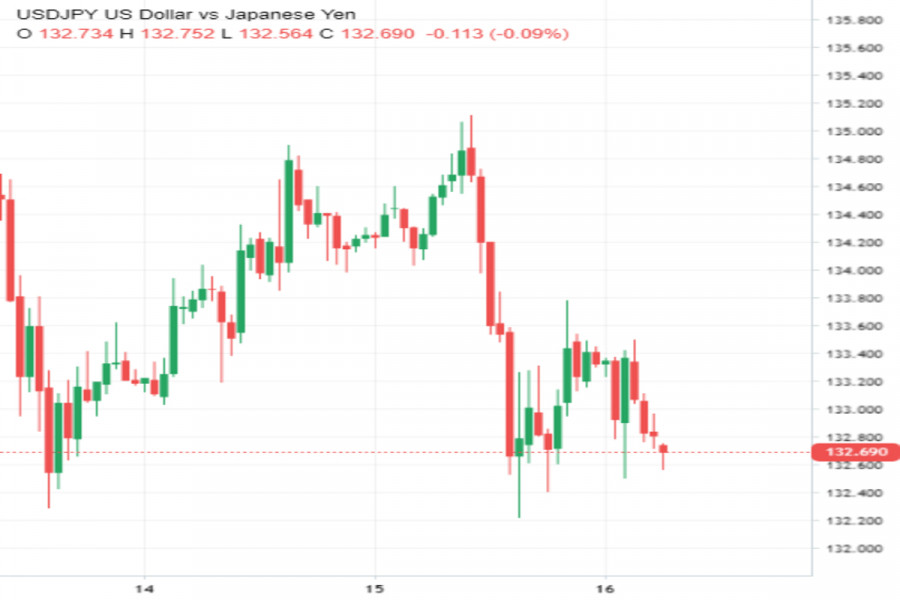

At the middle of the working week, the USD/JPY pair made a sharp turn to the downside and plunged into the abyss. Many analysts warn that the major has not yet exhausted its bearish potential and can go even deeper in the coming days.
On Wednesday, USD/JPY showed strong volatility, collapsing literally overnight by more than 2%: from 135.11 to 132.21.

The sudden weakness was provoked by the increased demand for the yen. Investors chose the Japanese currency as a safe haven because the market was seized by panic over the possible bankruptcy of the Swiss bank Credit Suisse, which could be a harbinger of a large-scale systemic crisis.
The wave of bank defaults that hit the US last week seems to have spread across the Atlantic to the European financial sector. Credit Suisse, Switzerland's second largest bank by assets, has become a new victim of the banking crisis.
Recall that on March 15, the shares of the Swiss financial giant fell by more than 30% after its largest shareholder, the National Bank of Saudi Arabia, ruled out the possibility of further investments in the company.
The collapse of Credit Suisse shares caused a rapid increase in 5-year credit default swaps of the flagship Swiss bank, which indicates a high probability of default.
Against this background, the European banking index (SX7P) collapsed by 7% yesterday, showing the largest one-day drop in 13 months.
This triggered a chain of negative events on the world stock markets and provoked a steep peak in the profitability of government bonds, including US ones.
On Wednesday, the yield of 10-year US Treasury bonds showed the sharpest decline in 4 months, and the yield of their 2-year counterparts fell to the lowest level since September 2022.
The fall in bond yields is due to growing market fears that in light of recent events, major central banks will be forced to pause monetary tightening in order not to cause additional shocks in the financial sector.
This scenario is very favorable for the yen, which has been under pressure from strong monetary divergence all last year.
Recall that the Bank of Japan still remains aloof from the global tightening trend and keeps interest rates ultra-low, despite the growing inflation in the country.
Now, when traders have doubts about the Federal Reserve's further determination and hopes for an early pivot of the BOJ, the yen has a good potential for growth against the dollar.
During Thursday's Asian session, the JPY received a boost from optimistic macro data from Japan.
Statistics on the volume of exports and imports for February were published this morning. It showed a sharp decline in Japan's trade deficit compared to the record negative balance recorded in January.
According to the data, Japan's trade deficit decreased from 3.5 trillion yen to 897.7 billion yen, which turned out to be better than analysts' forecasts.
The positive dynamics was achieved due to a decrease in imports caused by a slowdown in energy supplies, and an increase in exports due to car sales.
Bloomberg analysts believe that in March, Japan's trade deficit will remain at about the same level or shrink even more, which will indicate a gradual recovery of the fragile Japanese economy.
Earlier, the BOJ has repeatedly stated that one of the prerequisites for transitioning to monetary normalization is steady economic growth.
Increased exports are contributing to GDP growth, so the latest macro data has given hope to the yen bulls about a possible BOJ capitulation. At the time of writing, the pair was down 0.3%.
The headwind for the Japanese currency is Credit Suisse's statements. In the morning, the financial giant asked for help from its "big brother" – the Swiss National Bank.
In response, the SNB promised to provide the lender with $54 billion in financial support to prevent a global banking crisis.
The lifeline thrown for Credit Suisse calmed the markets a bit, against which the hawkish mood of traders strengthened again.
Now investors are waiting for the next round of rate hikes by major central banks. Today, the European Central Bank is likely to fulfill its promise and raise the rate by 0.50%, and next week the Fed will take over.
Most market participants are inclined to believe that the US central bank will go for a quarter point hike. The probability of such a scenario is currently estimated at 80%.
Of course, an increase in US rates will weigh on the yen and serve as fuel for the USD/JPY pair, but its growth will be limited by speculation about a possible change in the BOJ monetary rate.
Moreover, many analysts believe that in the next few days, the yen may grow again as a safe haven asset. In view of the shocking events of the last few days, investors need to be prepared for a new black swan.
"We expect USD/JPY to be quite volatile over the near term because of external uncertainties; however, a stock-take of the four domestic factors – the BoJ's policy tweak, residents' FX hedging, current account improvement, the JPY's safe haven status," economists at HSBC said.